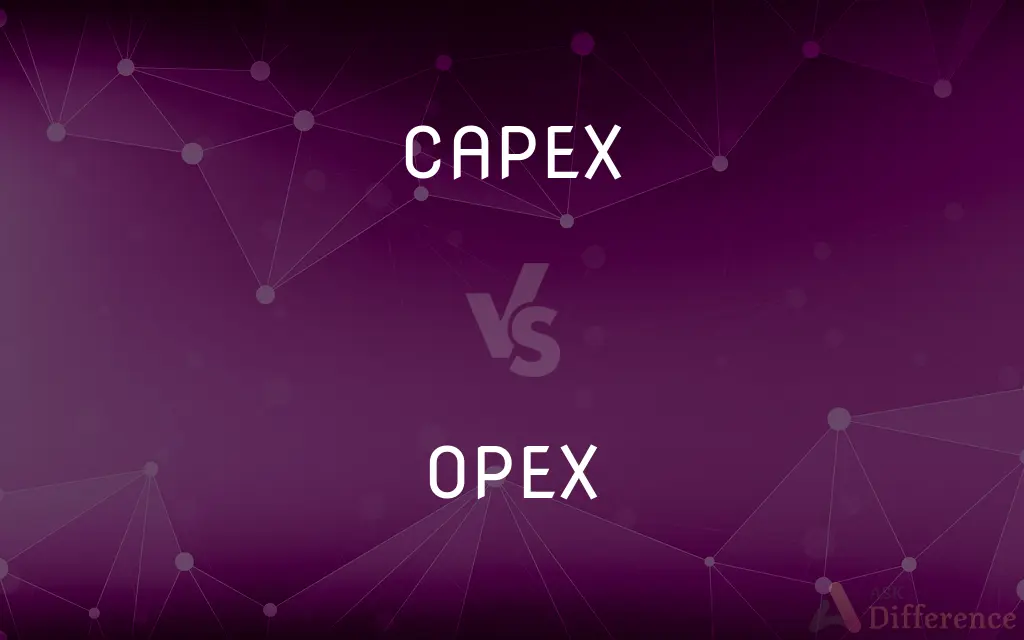CAPEX vs. OPEX — What's the Difference?
By Tayyaba Rehman — Published on October 31, 2023
CAPEX, or Capital Expenditure, refers to business expenses incurred to create future benefit, like purchasing assets, while OPEX, or Operating Expenditure, refers to expenses incurred in the course of day-to-day operations.

Difference Between CAPEX and OPEX
Table of Contents
ADVERTISEMENT
Key Differences
CAPEX and OPEX are critical financial terms representing two distinct types of business expenses. CAPEX, short for Capital Expenditure, refers to the funds used by organizations to acquire, upgrade, and maintain physical assets such as property, buildings, technology, or equipment. CAPEX is considered an investment with long-term implications, intended to create future benefits and value for the company. On the other hand, OPEX, short for Operating Expenditure, covers the day-to-day costs that a company incurs to run its daily business operations, such as rent, utilities, wages, and maintenance services. OPEX typically relates to the costs associated with producing and delivering the company’s goods and services.
Understanding the difference between CAPEX and OPEX is essential in business financial management as they are treated differently for accounting and tax purposes. CAPEX are capitalized, meaning their cost is amortized or depreciated over the life of the asset, spreading the cost over several years. This affects both the balance sheet and income statement, reducing taxable income gradually over time. Conversely, OPEX are considered as immediate expenses affecting profit and loss in the period they are incurred and directly reducing the taxable income for that period, offering immediate tax relief.
In terms of budgeting and financial planning, allocating resources to CAPEX and OPEX efficiently is vital for sustaining business operations and fostering growth. CAPEX generally involves substantial upfront costs but can lead to long-term sustainability and profitability due to the acquisition of assets that can generate income over time. OPEX, being recurrent and unavoidable, requires consistent monitoring and management to maintain operational efficiency and profitability, ensuring that the company can meet its ongoing financial obligations and sustain its daily operations.
From a strategic perspective, companies may opt for an OPEX model over a CAPEX model or vice versa based on their business needs, financial health, and market conditions. A preference for OPEX might be suitable for businesses seeking flexibility and lower upfront costs, such as startups or companies in dynamic markets. Meanwhile, companies with stable cash flows and long-term perspectives might prefer CAPEX, investing in assets that can bring sustained value and competitive advantage over time.
Concluding, while CAPEX is associated with acquiring and maintaining long-term assets intended to create future benefits, OPEX pertains to the regular, ongoing expenses necessary to ensure the smooth functioning of the business on a day-to-day basis. Both are integral components of business financial management, with distinct implications for accounting, taxation, strategic planning, and operational sustainability.
ADVERTISEMENT
Comparison Chart
Definition
Funds used to acquire and maintain physical assets
Costs incurred in the course of daily operations
Impact on Financial Statements
Capitalized and depreciated over time
Expensed in the period incurred
Tax Treatment
Provides tax relief gradually over time
Offers immediate tax relief
Strategic Perspective
Long-term investment for future benefits
Necessary for daily business operations
Budgeting Consideration
Involves substantial upfront costs
Requires regular allocation due to recurrent nature
Compare with Definitions
CAPEX
Offers tax benefits spread over several years.
Allocating funds to CAPEX can optimize the company's tax position over time.
OPEX
Pertains to the ongoing costs related to the daily operations of a business.
Rent and utilities are considered part of OPEX.
CAPEX
Expenses that are capitalized and depreciated over the asset's life.
The acquisition of new computers is considered a CAPEX.
OPEX
Expenses that are fully deducted in the accounting period they are incurred.
The costs of raw materials are recorded as OPEX in the financial statements.
CAPEX
Involves substantial upfront costs but can lead to long-term sustainability and profitability.
The CAPEX for advanced machinery can enhance production efficiency and product quality.
OPEX
Necessary for maintaining operational efficiency and business continuity.
Efficient management of OPEX is crucial for maintaining the company’s profitability.
CAPEX
Reflects a company’s commitment to investing in its future growth and productivity.
Increased CAPEX is often a sign of a company’s strategic focus on expansion and innovation.
OPEX
Offers immediate tax relief, reducing taxable income for the period incurred.
Managing OPEX effectively can provide significant tax advantages for the company.
CAPEX
Refers to the investment in long-term assets like property and equipment.
The company allocated a substantial CAPEX for a new manufacturing plant.
OPEX
Reflects the company's operational efficiency and financial management.
Analysis of OPEX provides insights into the company's operational performance and cost management.
Common Curiosities
Does CAPEX have an impact on a company’s profitability in the long run?
Yes, CAPEX can lead to long-term sustainability and profitability by creating future benefits and value for the company.
What does OPEX cover in a business?
OPEX covers the day-to-day costs incurred to run daily business operations such as rent, utilities, and wages.
How is CAPEX treated for accounting purposes?
CAPEX is capitalized and its cost is amortized or depreciated over the life of the asset.
Is managing OPEX crucial for maintaining operational efficiency?
Yes, effective management of OPEX is crucial for maintaining operational efficiency and ensuring the company can meet its ongoing financial obligations.
How is OPEX treated in accounting?
OPEX is considered an immediate expense and is fully deducted in the accounting period it is incurred.
What is CAPEX primarily used for in a business?
CAPEX is used primarily for acquiring, upgrading, and maintaining physical assets like property and equipment.
Share Your Discovery

Previous Comparison
Dungeness vs. Snow Crab
Next Comparison
Sanity vs. RationalityAuthor Spotlight
Written by
Tayyaba RehmanTayyaba Rehman is a distinguished writer, currently serving as a primary contributor to askdifference.com. As a researcher in semantics and etymology, Tayyaba's passion for the complexity of languages and their distinctions has found a perfect home on the platform. Tayyaba delves into the intricacies of language, distinguishing between commonly confused words and phrases, thereby providing clarity for readers worldwide.














































